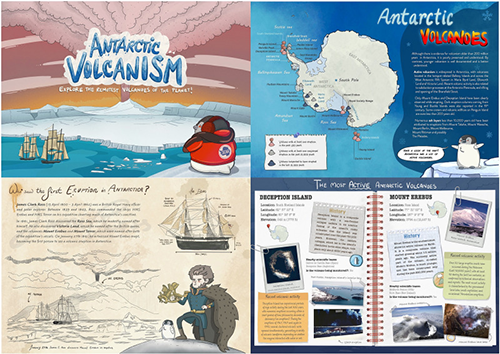Volcanism in Antarctica: An assessment of the present state of research and future directions

Geyer A., A. Di Roberto, J.L. Smellie, M. Van Wyk de Vries, K.S. Panter, A.P. Martin, J.R. Cooper, D. Young, M. Pompilio, P.R. Kyle, D. Blankenship, (2023).
Journal of Volcanology and Geothermal Research, 444.
https://doi.org/10.1016/j.jvolgeores.2023.107941
Abstract
Over the past decades, significant efforts have been made to understand the nature, dynamics and evolution of volcanic systems. In parallel, the continuous demographic expansion and extensive urbanization of volcanic areas have increased the exposure of our society to these natural phenomena. This increases the need to improve our capacities to accurately assess projected volcanic hazards and their potential socioeconomic and environmental impact, and Antarctica and the sub-Antarctic islands are no exception. More than a hundred volcanoes have been identified in Antarctica, some of which are entirely buried beneath the ice sheet and others as submarine volcanoes. Of these, at least eight large (basal diameters > c. 20-30 km) volcanoes are known to be active and pose a considerable threat to scientific and ever-increasing tourism activities being carried out in the region. Despite the scientific and socioeconomic interest, many aspects of the past volcanic activity and magmatic processes in Antarctica, and current volcanic hazards and risks, remain unknown. Moreover, many of Antarctica’s volcanoes preserve a remarkable history of the eruptive environment, from which multiple parameters of past configurations of the Antarctic ice sheet (AIS) can be deduced. Given the critical role that the AIS plays in regulating Earth’s climate, Antarctica’s volcanoes therefore can be regarded as the ground truth for current models of past climates derived from modelling and studies of marine sediments. Here, we provide a succinct overview of the evolution of volcanism and magmatism in Antarctica and the sub-Antarctic region over the past 200 million years. Then, we briefly review the current state of knowledge of the most crucial aspects regarding Antarctica’s volcanic and magmatic processes, and the contributions volcanic studies have made to our understanding of ice sheet history and evolution, geothermal heat flow, as well as present-day and future volcanic hazard and risk. A principal objective is to highlight the problems and critical limitations of the current state of knowledge and to provide suggestions for future potential directions of volcanic-driven investigations in Antarctica. Finally, we also discuss and assess the importance and scope of education and outreach activities specifically relating to Antarctic volcanism, and within the context of broader polar sciences.


Devi effettuare l'accesso per postare un commento.